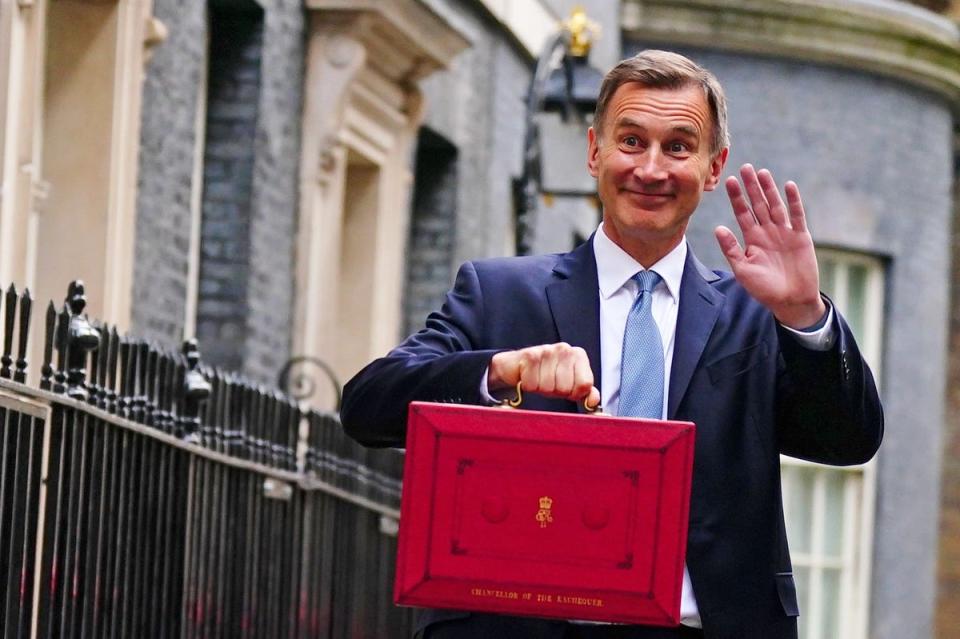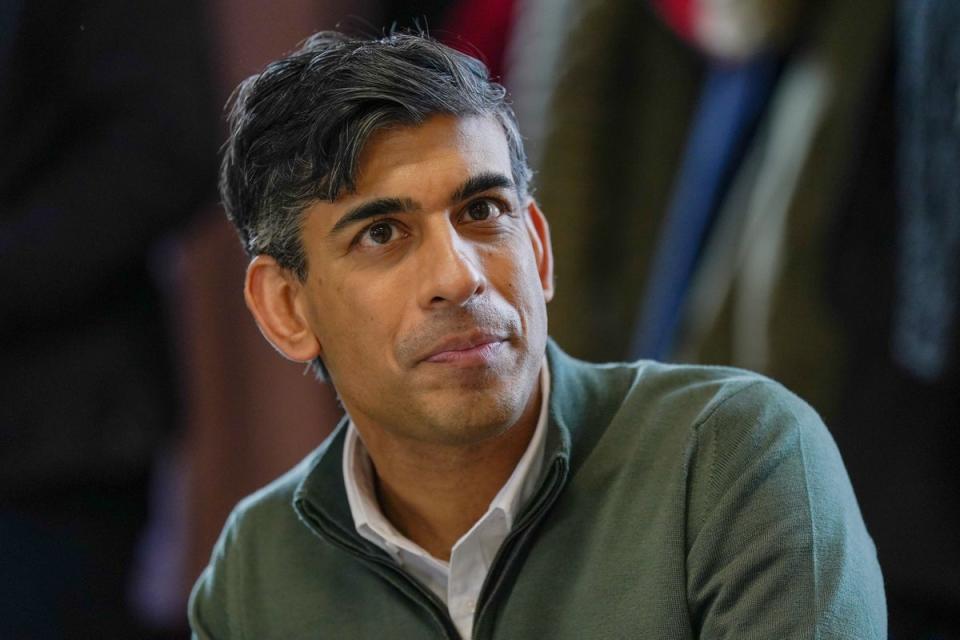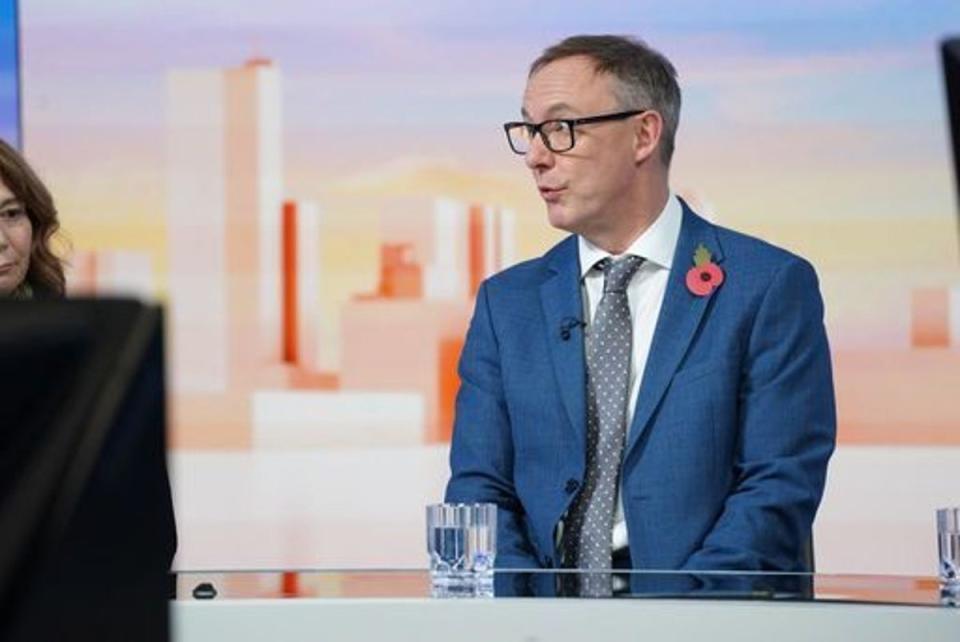Jeremy Hunt’s bleak message: ‘We can’t afford to cut tax after all’
Chancellor Jeremy Hunt has dampened hopes of tax cuts as he has admitted that there is less room in the spring budget than he had previously hoped.
Mr Hunt has confirmed he has warned the cabinet there is less scope for tax reductions on 6 March, despite clamour within the Tory ranks for cuts to try to woo voters ahead of the looming general election.
“It doesn’t look to me like we will have the same scope for cutting taxes in the spring budget that we had in the autumn statement,” Mr Hunt told BBC’s Political Thinking podcast.
“And so I need to set people’s expectations about the scale of what I’m doing because people need to know that when a Conservative government cuts taxes we will do so in a responsible and sensible way. But we also want to be clear that the direction of travel we want to go in is to lighten the tax burden.”
The comments come after warnings from financial institutions the government would be unwise to implement large tax cuts at a time of high debt and low public spending.
In last year’s autumn statement, the government announced a national insurance cut from 12 per cent to 10 per cent, which is estimated to cost the Treasury around £9.76 billion in the 2028 tax year.

But on Tuesday, the International Monetary Fund (IMF) said further tax cuts could risk the government’s ability to invest money in the NHS and other vital services.
Mr Hunt told ITV’s Peston on Wednesday evening: “We go through a process ahead of every budget and autumn statement where you don’t actually know the final numbers until a couple of weeks before. And we’re still in the middle of that process.
“As things stand at the moment – things can change – it doesn’t look like I’ll have the kind of room that I had for those very big tax cuts in the autumn. And I did mention that to the cabinet, yes.”
Mr Hunt is under a great deal of pressure from colleagues to cut taxes further if he can, as the party continues to struggle in the polls. The Conservatives are currently trailing behind Labour by as much as 20-points.

Speaking earlier this month during a visit to the World Economic Forum in Davos, Switzerland, the chancellor said “the direction of travel” is for the UK to emulate successful low-tax economies.
But the economic picture means this looks increasingly difficult for the chancellor. The IMF has downgraded the UK’s growth forecast for next year, expected to reach 0.6% this year, and 1.6% next.
This would make the UK economy the second-worst performer in the G7 this year and the joint third-worst performer in 2025.
Mr Hunt’s climb down follows a bleak warning from Paul Johnson, director for the Institute for Fiscal Studies, who said that promised tax cuts will need to be quickly reversed, as the increasing cost of debt will make them harder to fund.
Mr Johnson has since said that Mr Hunt could only pay for tax cuts in March by public spending cuts.
Tax could not be reduced “without a significant effect on public services” Mr Johnson told BBC Radio 4’s Today programme, suggesting that the chancellor show where cuts in public services would have to fall in order to fund tax reductions.
Responding to the IMF’s briefing on Tuesday, Mr Hunt said it was “too early to know whether further reductions in tax will be affordable in the Budget”.

Mr Hunt told the BBC that he agreed with the IMF that “untargeted tax cuts that are just crowd pleasers” are not a good idea.
“But if they are strategic, smart tax cuts then that is a very important part of the strategy to grow the economy,” he added.
Pressure for the chancellor to ignore the economic forecasts and proceed with tax cuts from his colleagues is ramping up, as former cabinet minister Sir David Davis told LBC’s Andrew Marr that the IMF should “go get lost” over its tax warning.
“We should stop listening to financial forecasts that are based on the prejudices of the people who write them,” he said.
The ex-Brexit secretary also said that “there will be tax cuts, the question is the size”.
Speaking on LBC, treasury minister Laura Trott set the Conservatives would aim to cut taxes in a “sustainable and responsible way”:
“We spent £400 billion during COVID. We spent £100 billion on protecting people’s energy prices during the energy crisis caused by Putin.
“I think those were the right decisions. We’ve got to pay that back. And a Conservative government will always be responsible with people’s finances. And so we took some difficult decisions.”
She added: “What the IMF are talking about was the balance of public spending versus tax cuts. And this is a really important debate that we should be having in this country.”
Labour said the IMF warning was “yet more evidence of 14 years of Conservative economic failure”.
Shadow chief secretary to the Treasury Darren Jones said: “The Tories have left Britain with high debt, flatlining growth, high taxes and working people worse off.”
And the Liberal Democrats said the “damning” IMF verdict showed the government’s “failure on the economy”.
Lib Dem Treasury spokesman Sarah Olney said: “This Conservative Government is a disaster for our economy and needs to leave Downing Street before even more damage is done.”

 Yahoo News
Yahoo News 
